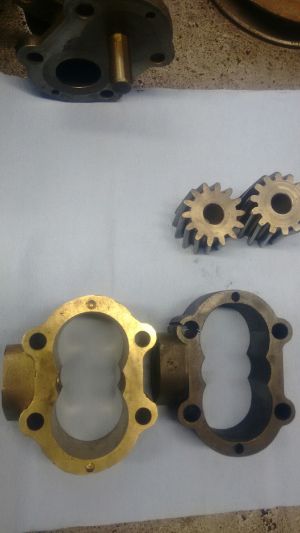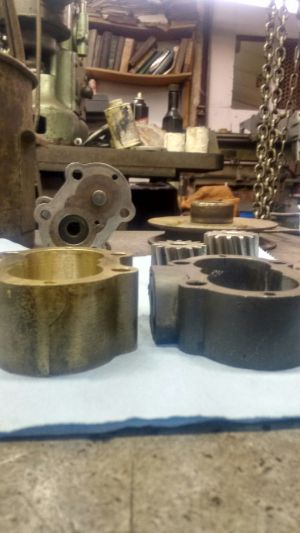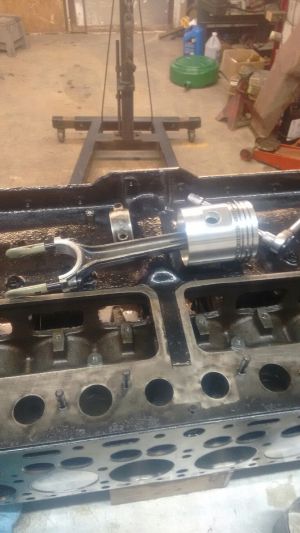- Home
- About Us
- Join/Renew
- Member Benefits
- Member Pages
- Log In
- Help
- Museum Store
Price change from 1930 to 1935 was similar to the PC computer era early on, in 1930 units could run 200 dollars, by 1935 they were much better in reception and operation and down to less than thirty dollars. I have an ad for a 1924 Rolls Royce Springfield Ghost, with radio………the size of the entire car trunk, on the real luggage rack, and it was only an additional 1200 dollars! Guess the 18,000.00 price tag on the car was not enough to scare off the purchasers.
My dad’s first job part time while going to high school was working at Grigsby Grunow Majestic cleaning up in the department where they made “battery eliminators” for old battery radios.
When I bought my 1933 Pierce, a hole was cut in the dashboard for a radio control head. Thanks to a couple of people, I was able to get a Pierce labeled Philco Model ME Radio which is currently being restored and soon should be installed in my car.
My dad’s first job part time while going to high school was working at Grigsby Grunow Majestic cleaning up in the department where they made “battery eliminators” for old battery radios.
When I bought my 1933 Pierce, a hole was cut in the dashboard for a radio control head. Thanks to a couple of people, I was able to get a Pierce labeled Philco Model ME Radio which is currently being restored and soon should be installed in my car.
Well after 3000 miles in the truck over 60 hours its home! We rolled it out of the trailer after 30 minutes of messing with it we found a broken or shorted wire from the coil to the dist in the plug wire tube and got it running! we drove it about a mile before having to pull it back to the house. i have a short list of stuff to fix and the more i look at the car the more questions i have. like there is a twist knob on the generator. It looks like some sort of voltage control.
I must not be smart enough to post photos so stand by
Congrats Eric, enjoy your new ride!
John
Eric,
We hope you can get the car sorted out in time to bring it to the Annual Meet in Indiana in June.
Good luck!
Dave Stevens
Eric
I usually have luck posting photos if they are in jpeg format.
Congrats on your new purchase.
One of the first things you should do is drop the oil pan and make sure there isn’t a sludge monster lurking in there.
As you sort out your car there are many, many helpful members in the PAS that will enthusiastically assist you in your new journey.
Generator output is controlled by moving the third brush inside, the only knob like thing I can think of in that area is a grease cup on my water pump.
+1 on pulling the oil pan, I found 3/4†of crud at the bottom of mine and it was close to starving the oil pump, it is well worth the time and price of the gasket. Another suggestion I was given by several members here was to pull the side cooling cover of and clean out the rust, mine had been done at some point but I still pulled out a lot of rust sediment. I’m still pulling it out of the block by my valves by the cupful now I have the head removed. I should have saved it as I went, it would have filled a coffee can, and as I said it was done at some point before!
Pictures seem to be an issue here as there is a severe size restriction, there is also a Pierce Arrow section on the AACA site that allows you much larger file sizes and if you go over on one posting you can reply to the same one with more pictures.
Congratulations on your car, it’s going to be a wonderful ride…
I have a bore scope wonder if i can see if there is sludge?
how many of you guys are also on facebook?
I have never had a FB account.
My only reason for me to get one would be to participate in the PAS FB page.
I tried with my borescope and all I could see was black but you couldn’t tell how thick it was. Looking back the thought that occurred was to remove the oil filler and stick a paint stirrer into the sump to gage the amount of sediment. For me it wouldn’t have mattered, my car has only driven 903 miles since 1954 going by an oil sticker in the door jamb so I knew darn well it wasn’t going to be pretty.
Ditto Craig’s comments on Facebook, I’m not really interested in it other than the curiosity factor.
The time and money you will spend to pull off the pan and see for sure what its like will be worth it. You will not be wondering, you will know.
much easier to post photos in FB
Hi Eric, the ‘trick’ to posting photos on this site is to ‘resize’ the image to no more than 1200KB. I usually reduce the resolution with one of the drop-down menu lists on the top bar of your browser.
PLEASE, PLEASE do not run your engine without dropping the oil pan ! Unlike many if not most modern vehicles, the oil pan is unobstructed by any frame cross member, or front axle. Just remove the bolts and use a 1″ putty knife to work between the gasket and the engine block. Often the gasket is reusable. I remove 4 bolts, one in each corner, and replace the short bolt with a 1-1/2″ long bolt, then remove the rest of the pan bolts, gently separate the gasket from the engine crankcase surface. The pan will drop and be held in position by the 4 long bolts. When the gasket is separated, then you can remove the last 4 long bolts and drop the pan and remove it.
The sludge is one problem, but the ’29 and ’30 pierce oil pumps used a POTMETAL pump gear housing. The top part that holds the shaft that is driven by the cam, and the bottom plate of the pump are cast iron. The middle of the three-part sandwich is made of pot metal, that over the years swells, and cracks and will not pump enough to keep you from ruining your engine.
There were several people making brass and bronze replacement gear housings. i and several other PAS members are exploring the reproduction of the pump gear-housing out of an aluminum alloy. Most or at least many modern engine oil pumps have the main housing made of aluminum.
If your oil pump still has the gray pot metal center gear housing, DO NOT RUN IT! If the center section is yellow metal, brass or bronze, it should be OK. If the pump has been replaced with a later all-iron pump, you are ok.
Greg Long
Greg is right. Here is a picture of my ’29 oil pump middle piece, and a brass replacement for a ’30 model. Greg and I are trying to find someone who will reproduce the middle sections. The ’29 and the ’30 (and later?) pumps are different, both in the bolt locations, and in the height of this piece. The ’29 is an inch thick, the ’30 is 1.25 inches thick. We put some clay on the bottom of the ’29 pump, and test fit the pan. It didn’t have enough clearance to accept the taller 1.25 inch pump, so we will have to make both for all the cars still needing to replace the pot metal pieces. Take a look at the picture: the brass is the 1,25 inch replacement part, the cracked part is what we pulled out of my engine.

Another view of the two pieces. Greg, if Mitch hasn’t called you, he will. Still trying to find a machine shop interested in making these parts.

While we are at it, here is a picture of the Aries piston set we installed. Egge pistons have been known to have issues. These are a work of art. I should have ordered 9 of them so I could put one in a display case.

Bob,
Do you know who made your new bronze housing? I think more than one person made these years ago.
